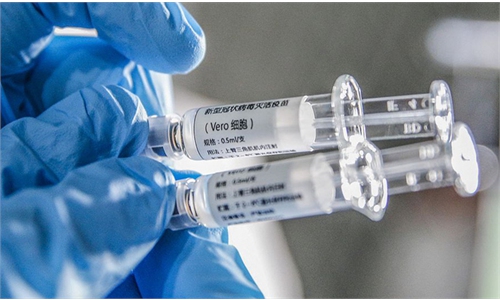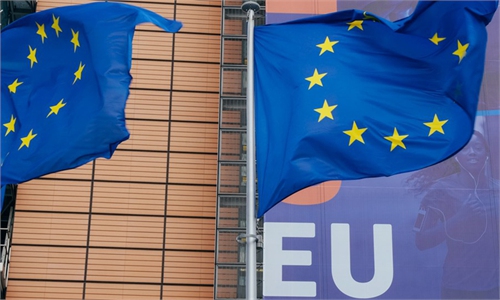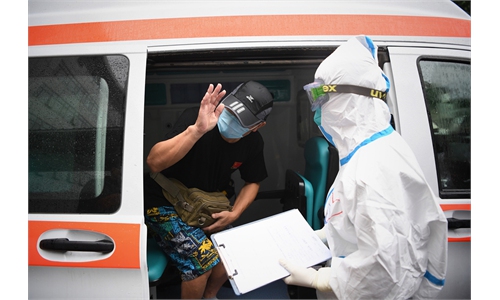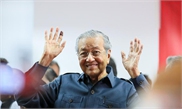A healthcare worker holds a vial of the Pfizer-BioNTech Covid-19 vaccine arranged at the University Hospital in Sungai Buloh, Selangor, Malaysia, on Tuesday, March 2,2021. The first phase of the vaccine roll-out that will run through April involves about 500,000 frontliners comprising health-care, defense and security personnel, as well as teachers with co-morbidities, according to the government. Photographer: Samsul Said/Bloomberg
IS the coronavirus racist?
Of course not. The Covid-19 and its variants do not discriminate between race, creed or borders. They simply infect everyone indiscriminately, so the only defence is vaccines and social distancing.
But the handling of the pandemic has become intensely political along racial, class and national lines. To debate whether it should be called a China virus or an Indian variant is racist by implication. What matters urgently is how each individual, community or nation handles the pandemic. To distribute to the rich and powerful first before the poor and weak is discriminatory, but that is exactly what has happened in many countries.
The virus transmits through people. The epidemiologists suggest that minimising people travel and contacts would slow the transmission.
Those who care more about money object to shutting down the economy. Asians reacted more quickly by adopting masks and staying at home.
The West cared more about individualism and objected to masks, allowing the pandemic to get out of control.
But money and vaccines have begun to bring matters under control, except that if the coronavirus and its variants continue to spread in countries which cannot afford vaccines or can’t get enough supplies, no one is safe.
Thus, a microscopic virus has opened up the Pandora’s Box of almost all social divisions that were ignored and unaddressed. It is clear that science and technology, as well as competent organisation, plus mass cooperation would be the way to solve the pandemic.
But these three factors require trust that everyone should be protected justly.
The record so far shows that those governments which preach democracy, equality and rules-based order may be practising something rather different.
Why is it that in the United States, Pacific Islander, Latino and Black Americans have double the Covid-19 death rate than White and Asian Americans?
Israel is leading in the world vaccination rollout, and yet Palestinians have been slow to get vaccines. The UN Human Rights body has called the Israeli differential treatment of Palestinians “morally and legally unacceptable”.
Israel has illegally occupied Palestinian territory since the 1967 war, and even in the Holy Month, physically raided the Al Aqsa Mosque, sparking off the current conflict that has raged on in the middle of the pandemic.
This is not an equal fight. More than 200 Palestinians have been killed, including 64 children, versus 12 dead in Israel. More than 58,000 Palestinians in Gaza have been rendered homeless and Israelis have knocked out the only lab in the territory that processes covid tests.
An Arab-Israeli member of the Israeli Parliament has openly called the Israel action in Jerusalem as “ethnic cleansing”. The Israeli government can ignore world opinion because of the US’ strong backing.
The humanitarian crisis in Palestine is beyond a tragedy. But the Israel-Palestinian crisis shows how science and technology play a role in turning a David to a Goliath, switching the roles from victims of the Holocaust to become perpetrators of Occupation by might alone.
As geopolitical futurist George Friedman writes about “Gaza: Morality and Reality”, the moral question is extremely complex because both sides see themselves as victims.
In his geopolitical realist view, as long as Israel holds the greater military superiority, with the backing of the strongest military power of all – the United States – the conflict will not be resolved by anyone else.
This point is fully understood by the Israelis, who were scattered and not particularly powerful as a wandering people until 1947. But it was their brains and deep application of science and technology that overcame the Palestinian and Arab numerical superiority.
There are 1-2-3 options for the Israel-Palestine situation. If Israel-occupied territory were to be governed as one country, the demographics would favour the Palestinians with higher birth rates, so this solution was ruled out.
Logic suggests that perhaps a two-country solution of a separate Palestine and Israel state would be possible. The rest of the world supports this option, but the Palestinians are divided into the Fatah faction controlling the West Bank and the Hamas controlling Gaza. This creates a three-state possibility. Indeed, the greater the division between its enemies and their supporters, the more secure Israel’s position. This is classic “divide and rule” domination exercised by imperial colonials.
The Egyptian economist Samir Amin summed up this perennial Arab dilemma, commenting on the 2011 Arab Spring.
If it succeeds, then the Arab world will break out of the imperialist centre’s control. If it fails, then the Arab world will remain in “its current status as a submissive periphery, prohibiting its elevation to the rank of an active participant in shaping the world”.
Samir’s critique of Capitalism in the Age of Globalisation saw a capitalist centre comprising America, Europe and Japan, controlling a periphery of the rest.
This is achieved through five monopolies over technology, financial control, monopoly access to natural resources, media and communications, and weapons of mass destruction. The Israelis understood these perfectly and exploited them to achieve success and survival.
Thus, Israeli devotion to science and technology, military equipment, media and communications and their lobbying power playing guilt on the Eurocentric countries, ensure their dominance over the Palestinian and Arab opponents.
This is why faith or ideology alone will not control the pandemic, because it is through science and organisational power that domination continues over the weak and oppressed.
The Arab world may have physical control over much of the fossil-fuel natural resources, but as long as they remain technologically backward and divided, they will always be victims.
So, the coronavirus is not racist.
Guns do not kill people, people kill or dominate other people.
Friedman is right. Might decides geopolitical reality. For him and his ilk, morality is for the victim to complain and the victor to preach.
Those who do not learn from history will remain its victims.
Andrew Sheng comments on global affairs from an Asian perspective. The views expressed here are his own.
RELATED NEWS
It’s time to help the Palestinians, says Hisham
The hunt for mutations | The Star
MCO 3.0: Tighten SOP announcement expected at 5pm on...
Tighter MCO 3.0: 80% of govt staff, 40% of private sector to work from home...























